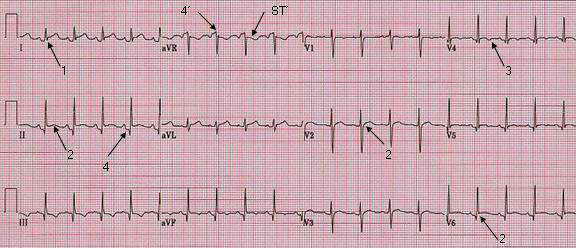 |
I II II aVR aVR V4 V4 |
| 1 = ST elevation in stage 1. 2 = ST T change in stage 2. 3 = ST T change in stage 3. 4 = PR shift. 4' = PR shift in aVR. ST' = Reciprocal ST depression in aVR (only) |
| Pericarditis, acute (Case 2) |
| Patient. 19 yo female Down syndrome with history of flu like illness for one week. She had chest pain on admission. There was no pericardial friction rub. Echocardiogram showed small pericardial effusion. Troponin was 5.7. |
ST
T abnormality in Pericarditis. |
| Go
to Differential diagnosis of ST elevation Go to ST-T-U abnormalities menu |